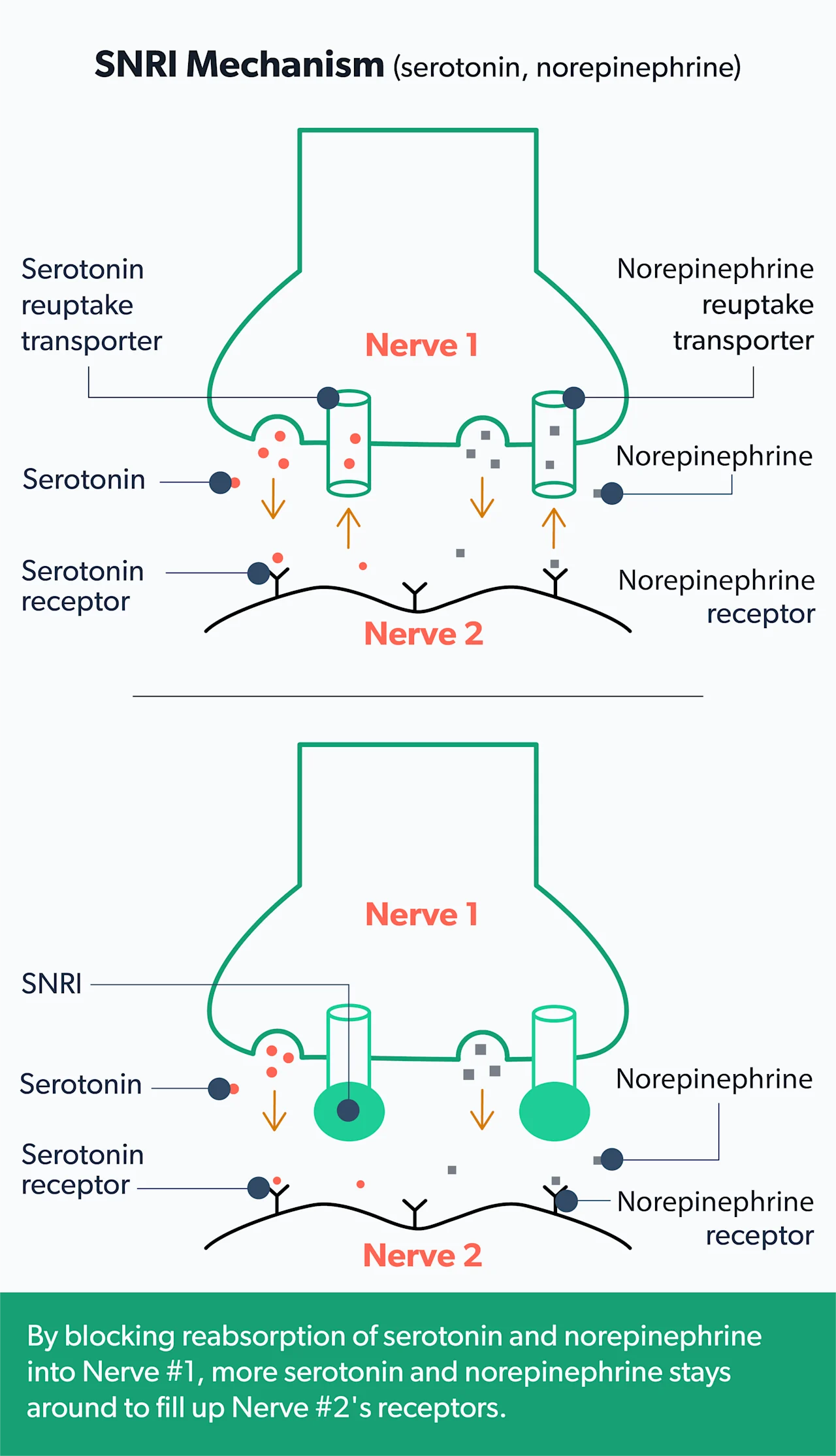Here's what we'll cover
Here's what we'll cover
Here's what we'll cover
If you’ve been prescribed venlafaxine or Effexor XR, you may wonder if it’s okay to drink alcohol while taking it. Learn about the side effects and risks of drinking that glass of wine when taking this antidepressant.
What is venlafaxine?
Venlafaxine, also known by its brand name, Effexor XR, is a serotonin-norepinephrine reuptake inhibitor (SNRI) antidepressant. Serotonin and norepinephrine are neurotransmitters found in the nervous system and brain. These neurotransmitters send messages to your brain cells that help to control your mood. Low levels of these neurotransmitters contribute to feelings of depression and anxiety. Venlafaxine balances the levels of serotonin and norepinephrine to improve your mood (Singh, 2020).

This medication is approved by the U.S. Food and Drug Administration (FDA) to treat major depressive disorder (MDD), anxiety disorder, social anxiety disorder, and panic disorder. Some healthcare professionals use venlafaxine to treat attention deficit disorder (ADD), migraine prevention, post-traumatic stress disorder (PTSD), obsessive-compulsive disorder (OCD), complex pain syndromes, fibromyalgia, diabetic neuropathy, premenstrual dysphoric disorder (PMDD), and hot flashes in menopausal women (Singh, 2020).
Venlafaxine comes in immediate-release and extended-release tablets. The brand name version, Effexor XR, only comes as an extended-release capsule (NAMI, 2020).
What are the side effects of venlafaxine?
All antidepressant drugs have side effects. Some of the common side effects of venlafaxine start when you first take it but go away as you get used to the medication (NAMI, 2020).
Common side effects
Here are some of the most common side effects of venlafaxine (NAMI, 2020):
Constipation
Dizziness
Dry mouth
Loss of appetite
Nausea
Sweating
Trouble sleeping
Weakness
Some adverse effects of venlafaxine may not go away over time. You may want to seek medical advice about lowering your dose or changing your medication if you have persistent side effects of venlafaxine. Some side effects that are more likely to be ongoing include loss of libido, erectile dysfunction, or an inability to orgasm. Some people develop high blood pressure when taking venlafaxine (NAMI, 2020).
Serious side effects
Serious side effects from venlafaxine can occur. If you experience any of these symptoms, call your healthcare provider immediately or call 911 (Wyeth Pharmaceuticals, 2018)
Abnormal bleeding, including coughing up blood, nosebleeds, bruising easily and often, or blood in your stool
High blood pressure with headache or shortness of breath
Hyponatremia or low sodium levels with fainting, headache, feeling weak, or seizures
Lung problems like pneumonia with chest pain, fever, cough, and shortness of breath
Dangerous side effects
In rare cases, dangerous side effects are possible. These include (Wyeth Pharmaceuticals, 2018):
Seizures
Serotonin syndrome, a condition in which your serotonin levels are too high. You can have shakiness, fever, diarrhea, rapid heartbeat, anxiety, and seizures.
Suicidal thoughts and behaviors: Effexor and venlafaxine have a black box warning from the FDA for this potentially serious side effect in children, teens, and young adults under 24 (FDA, 2012).
Can you drink alcohol when taking venlafaxine?
Alcohol interacts with many medications, including antidepressants. It is always best to speak to your healthcare provider to see if drinking alcohol when taking venlafaxine is appropriate for you.
Venlafaxine and alcohol each have side effects, and these can worsen when you combine them. If you experience some of the side effects of venlafaxine, you may not be able to tolerate the combined impact of alcohol and venlafaxine (NAMI, nd).
There are two main reasons it’s not a good idea to mix alcohol and venlafaxine.
1. Increased side effects
Alcohol and venlafaxine have similar side effects of dizziness, drowsiness, and weakness. Using them together intensifies their side effects.
Some of the side effects of mixing alcohol and venlafaxine include (Wyeth Pharmaceuticals, 2018):
Anxiety
Blackouts or short-term memory loss
Confusion
Delayed reaction times
Dizziness
Drowsiness
Impairment
Poor muscle coordination
Problems moving your body
Alcohol can cause erectile dysfunction, and venlafaxine has sexual dysfunction side effects, including erectile dysfunction (ED). If you are a person who struggles with this issue, you may want to stay away from alcohol when taking venlafaxine, as your risk for ED significantly increases (Wyeth Pharmaceuticals, 2018).
2. Decreased effectiveness
Drinking alcohol when you take venlafaxine decreases the effectiveness of your antidepressant medication (Wyeth Pharmaceuticals, 2018).
What are the dangers of mixing alcohol and venlafaxine?
Mixing alcohol and venlafaxine can create severe and even life-threatening side effects.
Venlafaxine is used to help treat mental health conditions. Alcohol decreases venlafaxine’s effectiveness in treating your symptoms, potentially worsening your mental health or preventing improvement. You may feel intense anxiety, paranoia, deep sadness, and extreme mood swings (Wyeth Pharmaceuticals, 2018).
The liver metabolizes both alcohol and venlafaxine. You raise your risk of liver damage just from drinking alcohol. That risk increases when combining your medication and alcohol. Venlafaxine also raises blood pressure in some individuals and can create severe heart-related problems when combined with alcohol (Wyeth Pharmaceuticals, 2018)l.
If you drink alcohol when taking your dose of venlafaxine, you dramatically increase your risk of bleeding. You may experience nosebleeds and frequent bruising. Internal bleeding in your stomach or brain is also a possibility when combining venlafaxine with alcohol (Wyeth Pharmaceuticals, 2018).
If you or your loved one has any of these symptoms, call your healthcare provider or 911 immediately.
The road to recovery
If you or a loved one want help with alcohol dependency, please call the Substance Abuse and Mental Health Services Administration National Helpline at 1-800-662-HELP.
If your healthcare provider prescribes venlafaxine, tell them about any typical alcohol use you may have. They may make recommendations on how much alcohol you can have based on your physical and mental history and health (NIAAA, 2014)
Follow your healthcare provider’s instructions while on venlafaxine to ensure a safe road to recovery.
DISCLAIMER
If you have any medical questions or concerns, please talk to your healthcare provider. The articles on Health Guide are underpinned by peer-reviewed research and information drawn from medical societies and governmental agencies. However, they are not a substitute for professional medical advice, diagnosis, or treatment.
References
National Alliance on Mental Illness. (n.d). Can I drink alcohol while taking antidepressants? Retrieved from https://www.nami.org/FAQ/Mental-Health-Medication-FAQ/Can-I-drink-alcohol-while-taking-antidepressants
National Alliance on Mental Illness (NAMI). (2020). Types of medications: Venlafaxine. Retrieved from https://www.nami.org/About-Mental-Illness/Treatments/Mental-Health-Medications/Types-of-Medication/Venlafaxine-(Effexor)
National Institute on Alcohol Abuse and Alcoholism (NIAAA). (n.d). Alcohol’s effects on the body. National Institute of Health (NIH) . Retrieved from https://www.niaaa.nih.gov/alcohols-effects-health/alcohols-effects-body
National Institute on Alcohol Abuse and Alcoholism (NIAAA). (2014). Harmful interactions. National Institute of Health (NIH) . Retrieved from https://pubs.niaaa.nih.gov/publications/Medicine/medicine.htm
Singh, D. & Saadabadi, A. (2020). Venlafaxine. [Updated Aug 6, 2021]. In: StatPearls [Internet]. Retrieved from https://www.ncbi.nlm.nih.gov/books/NBK535363/
US Food and Drug Administration (FDA). (2012). A guide to drug safety terms at FDA. Retrieved from https://www.fda.gov/media/74382/download
Wyeth Pharmaceuticals, Inc.. (2018). Effexor XR., venlafaxine hydrochloride. Retrieved from http://labeling.pfizer.com/showlabeling.aspx?ID=100#section-7.3





